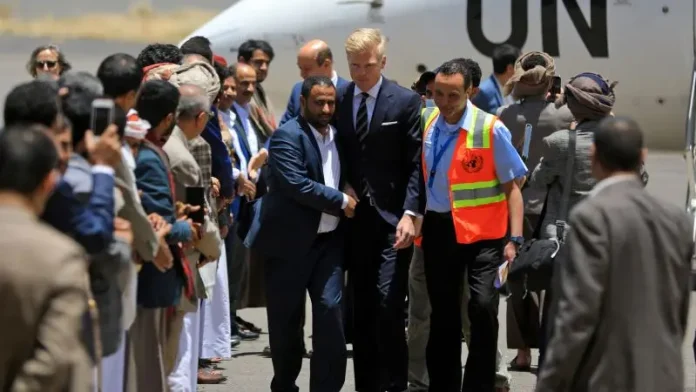The Yemeni government and the Houthi group have reached a significant agreement to de-escalate tensions related to the banking sector and air travel, Arab media reported.
According to a statement released today by the UN special envoy for Yemen, Hans Grundberg, the two sides agreed on a number of measures. These include cancelling recent decisions against banks, resuming and increasing to three daily Yemenia Airways flights between Sanaa and Jordan, and operating flights to Cairo and India as needed.
They will also address the administrative, technical and financial challenges faced by Yemenia Airways and convene meetings to discuss economic and humanitarian issues based on a roadmap.
The parties have sought UN support for these commitments, and Grundberg acknowledged Saudi Arabia’s significant role in facilitating the agreement.
However, the governor of Yemen’s central bank, which supports the internationally recognised government, resigned in protest against the deal, citing fears that ending central bank decision-making would reinforce Houthi domination of the banking sector.
Earlier, Houthi leader Abdul Malik al-Houthi accused Saudi Arabia of economic pressure on his movement after Riyadh instructed the Yemeni government to relocate commercial and banking centres from Sanaa to Aden in the south of the country and halt flights from Sana’a International Airport, threatening to attack Saudi banks, airports and ports in response.
In April, Yemen’s Central Bank in Aden decided to move the main offices of commercial and Islamic banks, as well as local and foreign microfinance organisations operating in Yemen, from Sana’a to Aden within 60 days, promising to take legal action against those who fail to do so.
Grundberg announced late last December that the Yemeni parties had reached an agreement to implement a series of measures aimed at establishing peace, including agreeing to respect a ceasefire across Yemen and beginning preparations for the resumption of an inclusive political process under the auspices of the UN.
For the tenth consecutive year, the Arab country has been plagued by an ongoing power struggle between the internationally recognised government and an Iranian-backed Shiite group. The consequences of the conflict have caused a serious humanitarian crisis.
Yemeni Hodeidah is up and running again
Meanwhile, Yemen’s Red Sea port of Hodeidah received the first commercial ships after Saturday’s Israeli strike that severely damaged its facilities, while smoke from fuel tankers continues to billow, authorities at the crucial entry point said.
According to Mohammed Al Sayes, director of maritime operations at the Houthi-run port, a ship carrying 514 containers of various goods and another vessel with some 20,000 tonnes of iron arrived at the port on Tuesday evening. He said:
“Hodeidah port is operating normally round the clock and is accepting all vessels.”
The port has become a lifeline for a country experiencing war, economic turmoil and one of the world’s worst humanitarian crises. It is crucial to the survival of millions of citizens, making it the centre of humanitarian efforts and military conflicts.
On Saturday, Israeli warplanes struck a fuel depot in a Houthi-controlled port, killing nine people and injuring at least 83. The air raid was in response to a drone attack on Tel Aviv that killed one person and injured several others a day earlier.
